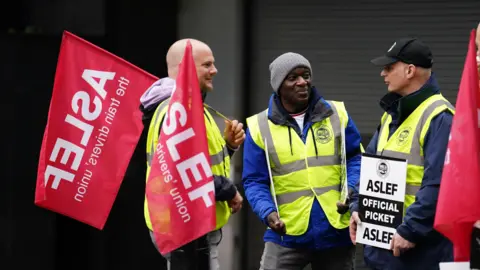[ad_1]
 PA Media
PA MediaThe government has started to undo Conservative-era rules limiting strike action by workers including teachers, firefighters and train workers.
Labour ministers have told employers not to enforce legal minimum service levels whilst a new law to formally abolish them goes through Parliament.
They argued the rules, which came in last year but were never used, would “unduly restrict” the right to strike.
The Conservatives said the move to start phasing them out, first reported by the Observer, would put access to emergency services at risk.
“By surrendering to their union paymasters, Labour are showing us who is really in charge,” added shadow business secretary Kevin Hollinrake.
Unions, who strongly opposed minimum service levels when they were introduced by the previous government, have welcomed the move to undo them.
Police officers, members of the armed forces and some prison officers are banned from striking, whilst industrial action by health unions is limited by separate legislation preventing them from endangering human life.
However, the last government significantly extended anti-strike laws as it grappled with waves of industrial disputes in the wake of rising inflation.
It passed legislation enabling ministers to set minimum service levels for fire, education and transport services, as well as border security and nuclear decommissioning, in England, Scotland and Wales.
It also applied to health services, where Tory ministers argued the existing system to guarantee “life and limb” cover through individual deals with unions had only guaranteed patchy levels of service during walkouts.
Labour opposed the legislation at the time, and has promised to abolish it as part of a wider bill to boost employment rights.
The bill is set to begin its journey through Parliament by mid-October, but it could be well into next year before it becomes law.
In the meantime, ministers in affected departments have been asked to “encourage employers” to avoid imposing minimum service levels until they are formally abolished, according to a policy document.
New pay deals
Proposed rules would have enabled train firms to run about 40% of rail services on strike days, and fire services to crew 73% of fire engines.
Some employees would be required to work during industrial action and could be sacked if they refuse, while unions failing to comply could face damages claims from employers of up to a million pounds.
But the minimum service rules, which unions argued were unworkable, have never been implemented during a dispute, with train operators choosing not use them during strikes in January.
A number of industrial disputes have been resolved since the minimum service levels legislation was passed, although some, notably with rail workers, remain ongoing.
Labour has decided to give many public sector workers, including teachers and some NHS staff, pay rises of 5.5-6% this year, costing around £11.6bn more than the 2% budgeted for by the last government.
It has also offered junior doctors in England a deal worth 22% on average over two years in a bid to end the NHS’s longest-running pay dispute.
The Labour government also wants to allow trade unions to ballot members about proposed strike action online, and change rules on trade union recognition.
The party previously vowed to repeal legislation allowing employers to use agency staff to cover striking workers, but has now concluded this is not necessary since the measure was struck down by the High Court last year.
[ad_2]
Source link freeslots dinogame telegram营销




